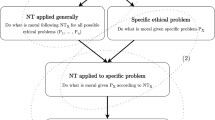Abstract
In this paper I synthesize a unified system out of Peirce's life work, and name it “Peirce's Evolutionary Pragmatic Idealism”. Peirce developed this philosophy in four stages:
-
(I)
His 1868–69 theory that cognition is a continuous and infinite social semiotic process, in which Man is a sign.
-
(II)
His Popular Science Monthly pragmatism and frequency theory of probabilistic induction.
-
(III)
His 1891–93 cosmic evolutionism of Tychism, Synechism, and Agapism.
-
(IV)
Pragmaticism: The doctrine of real potentialities (“would-be's”), and Peirce's pragmatic program for developing concrete reasonableness.
Peirce's evolutionary conception of the cosmos is pantheistic, and he constructed it to reconcile religion with Darwinian evolution.
Similar content being viewed by others
References
Brent, Joseph: 1993, Charles Sanders Peirce—A Life, Indiana University Press, Bloomington.
Burks, Alice R. and Arthur W. Burks: 1988a, The First Electronic Computer: The Atanasoff Story, University of Michigan Press, Ann Arbor.
Burks, Arthur W. and Alice R. Burks: 1988b, ‘The History of Early Computer Switching’, Grazer Philosophische Studien 32, 3–36.
Burks, Arthur W.: 1943, ‘Peirce's Conception of Logic as a Normative Science’, The Philosophical Review 2, 383–88.
Burks, Arthur W.: 1946a, ‘Laws of Nature and Reasonableness of Regret’, Mind 55, 170–72.
Burks, Arthur W.: 1946b., ‘Peirce's Theory of Abduction’, Philosophy of Science 13, 301–06.
Burks, Arthur W.: 1951a, ‘The Logic of Causal Propositions’, Mind 60, 363–382.
Burks, Arthur W.: 1951b, ‘Introduction to Peirce Selections’, in Max Fisch (ed.), Classic American Philosophers, Appleton-Century-Crofts, New York, pp. 41–53. The 1966 printing has an additional note on p. 113.
Burks, Arthur W.: 1964, ‘Peirce's Two Theories of Probability’, in Edward C. Moore and Richard S. Robin (eds), Studies in the Philosophy of Charles Sanders Peirce, University of Massachusets Press, Amherst, pp. 141–50.
Burks, Arthur W.: 1972–73, ‘Logic, Computers, and Men’, Proceedings and Addresses of the American Philosophical Association 46, 39–57
Burks, Arthur W.: 1977, Chance, Cause, Reason — An Inquiry into the Nature of Scientific Evidence, University of Chicago Press, Chicago. Paperback, 1979.
Burks, Arthur W.: 1980, ‘Man: Sign, or Algorithm? A Rhetorical Analysis of Peirce's Semiotics’, Transactions of the Charles S. Peirce Society 16, 279–92.
Burks, Arthur W.: 1986, Robots and Free Minds, College of Literature, Science, and the Arts, University of Michigan, Ann Arbor.
Burks, Arthur W.: 1988a, ‘The Logic of Evolution and the Reduction of Coherent-Holistic Systems to Hierarchical-Feedback Systems’, in William Harper and Bryan Skyrms (eds.), Causation in Decision, Belief, Change and Statistics, Kluwer Academic Publishers, Dordrecht.
Burks, Arthur W.: 1988b, ‘Teleology and Logical Mechanism’, Synthese 6, 333–70.
Burks, Arthur W.: 1990, ‘The Philosophy of Logical Mechanism: My Replies to My Critics’, pp. 349–531 of Salmon 1990.
Burks, Arthur W.: 1995, ‘Logic, Learning, and Creativity in Evolution’, in Don Roberts, Nathan Houser and James van Evra (eds.), Studies in the Logic of Charles S. Peirce, Indiana University Press, Bloomington (to be published).
Curley, Edwin, editor and translator: 1994, A Spinoza Reader—The Ethics and Other Works — Benedict de Spinoza. Princeton University Press, Princeton.
Kant, Immanuel: 1781, 1787, Kritik der reinen Vernunft. English translation by N. K. Smith (1933), Critique of Pure Reason, Macmillan, London.
Moore, Edward C. and Arthur Burks: 1992, ‘Three Notes on the Editing of the Works of Charles S. Peirce’, Transactions of the Charles S. Peirce Society, 28, 83–106.
Peirce, Charles S.: 1887, ‘Logical Machines’, The American Journal of Psychology, 1, 165–70.
Peirce, Charles S: Collected Papers of Charles Sanders Peirce, Vols. 1–6, 1931–35, edited by Charles Hartshorne and Paul Weiss; Vols. 7–8, 1958, edited by Arthur W. Burks; Vol. 8 contains a bibliography of Peirce's published works, Harvard University Press, Cambridge. Peirce citations in this paper are to volume and paragraph: e.g., 7.361 refers to vol. 7, par. 361.
Peirce, Charles S. Writings of Charles S. Peirce — A Chronological Edition, An edition of perhaps 30 volumes is in progress, of which 5 volumes have appeared, 1982 on. Edward Moore was the founding editor; the chief editors have been Max Fisch, Christian Kloesel, Nathan Houser, and Don Roberts, Indiana University Press, Bloomington.
Roberts, Don D.: 1973, The Existential Graphs of Charles S. Peirce, Mouton, The Hague.
Salmon, Merrilee H. (ed.): 1990, The Philosophy of Logical Mechanism — Essays in Honor of Arthur W. Burks, with his responses and a bibliography of his works, Kluwer Academic Publishers, Dordrecht/Boston/London.
Weiss, Paul and Arthur Burks: 1945, ‘Peirce's Sixty-Six Signs’, The Journal of Philosophy 42, 383–88.
Wiener, Philip: 1949, Evolution and the Founders of Pragmatism, Harvard University Press, Cambridge.
Author information
Authors and Affiliations
Additional information
This article is dedicated to the memory of Edward Carter Moore (1917–1993) — for his many contributions to Peirce scholarship. Ed wrote on Peirce, James, and Dewey. As Dean of the Graduate School of the University of Massachusetts he founded the Transactions of the Peirce Society. In 1973 he became Dean of the Faculties and Professor of Philosophy at Indiana University/Purdue University at Indianapolis, in charge of academic matters of that newly organized institution. In that role he founded and directed the new chronological edition of Peirce's writings.
Rights and permissions
About this article
Cite this article
Burks, A.W. Peirce's evolutionary pragmatic idealism. Synthese 106, 323–372 (1996). https://doi.org/10.1007/BF00413590
Issue Date:
DOI: https://doi.org/10.1007/BF00413590



